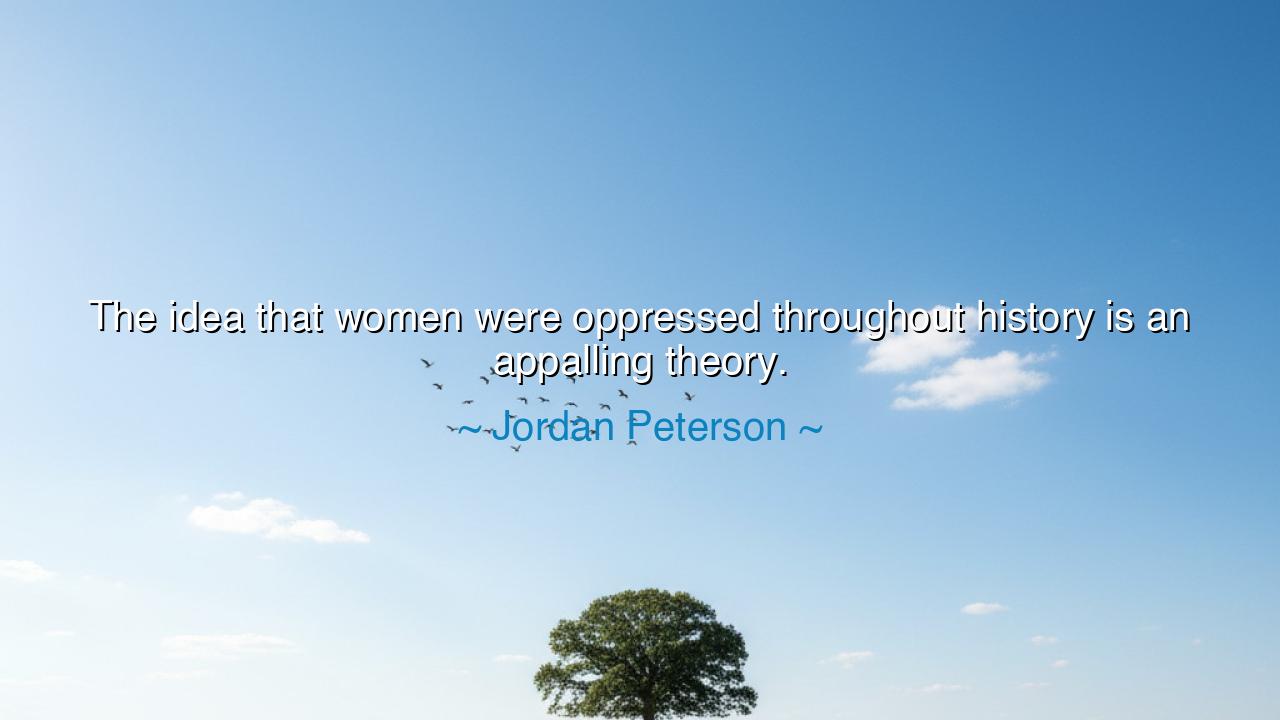
The idea that women were oppressed throughout history is an






“The idea that women were oppressed throughout history is an appalling theory.” — Thus declared Jordan Peterson, the modern philosopher of order and chaos, whose words provoke as much as they enlighten. His statement, at first hearing, may seem defiant — a challenge to the common telling of history. Yet beneath its edge lies a deeper meditation on the complexity of human partnership, on the shared burdens of man and woman in the great unfolding of civilization. Peterson’s words are not a denial of suffering, but a rejection of simplification — the notion that history can be reduced to the rule of one sex over another. Instead, he calls us to see the human story as a mutual struggle for survival, waged together against the forces of nature, poverty, and time itself.
To call this idea “appalling” is not to dismiss the pain that women have endured, nor to deny the injustices that scar the record of humanity. It is, rather, to lament the distortion that arises when suffering is seen as the product of malice alone. For much of history, life was not ruled by the privilege of men, but by the cruelty of circumstance — by hunger, disease, war, and death. Men and women alike were bound in the same chains of necessity, each bearing a portion of the world’s burden. Women gave life through labor; men defended it through toil and blood. Theirs was not a war of sexes, but a covenant of endurance. To divide that story into victim and oppressor is, as Peterson suggests, to betray the truth of our shared humanity.
Consider the tale of the peasant woman of the Middle Ages — her hands hardened by labor, her back bent in the fields beside her husband. The two of them lived not as master and slave, but as partners in the same harsh world. They fought together against famine and winter, bound by the necessity of survival. Or think of the pioneers who crossed wild frontiers, their fates interwoven. The women bore children, healed the sick, managed households in wilderness; the men hunted, built, and died young. There was no comfort, no privilege — only endurance. To call one sex the oppressor of the other is to erase the dignity of their mutual sacrifice, and to overlook the strength that women wielded not through dominance, but through resilience and wisdom.
Peterson’s insight cuts deeper still: he warns against the resentment that grows from historical revision. When the past is viewed solely through the lens of grievance, the living become enslaved to anger toward the dead. To believe that all women were victims and all men were tyrants is to sow bitterness where understanding might have taken root. It blinds us to the truth that cooperation, not conquest, built the world we now inhabit. Civilization — with all its flaws — arose from the labor of both sexes, joined in purpose and in pain. The progress of humankind has never been a single triumph of one over another, but the hard-won fruit of shared endurance.
Yet, Peterson’s words do not deny the reality that injustice existed — that in many ages, women’s voices were silenced, their rights curtailed, their genius unacknowledged. Rather, he urges that we see such injustices in their broader human context. Oppression was not the exclusive fate of women, but the common condition of nearly all humanity. In the feudal ages, most men were not masters but serfs; in ancient kingdoms, even kings were slaves to duty, and queens, though crowned, bore the chains of expectation. History is not the story of evil men suppressing pure women, but of flawed beings, both male and female, striving together toward the light.
This truth does not diminish the heroism of the women who rose against true oppression — those who shattered boundaries of art, science, and spirit. Indeed, it magnifies them. Joan of Arc, standing before the fires of her accusers, was not a victim of men, but a witness to the courage that transcends all divisions. Marie Curie, working in the shadows of laboratories, did not see men as her enemies, but ignorance as her adversary. They remind us that progress comes not through blame, but through the unity of courage, faith, and intellect — virtues shared by both sexes in equal measure.
Let this be your lesson, my listener: when you look upon history, do not seek guilt or grievance, but understanding. Honor the sacrifices of women, but also the burdens of men. Remember that both carried civilization forward — side by side, often in silence, always in struggle. The wisdom of Peterson’s words lies not in dismissing suffering, but in freeing us from the bitterness that divides. For resentment blinds, but gratitude heals.
And so, remember this truth: men and women were never enemies, but companions in the same long journey. They built, they bled, they loved, and they endured together. The story of humanity is not the tale of oppression, but of cooperation — a vast symphony of shared striving. To recognize this is not to deny the past, but to redeem it, and in that redemption, to build a future founded not upon division, but upon mutual honor and respect.






AAdministratorAdministrator
Welcome, honored guests. Please leave a comment, we will respond soon